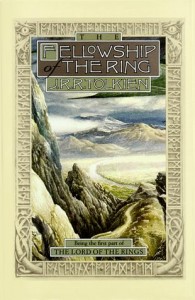 Well, isn’t this wonderful?
Well, isn’t this wonderful?
Seventeen years ago there appeared, without any fanfare, a book called “The Hobbit” which, in my opinion, is one of the best children’s stories of this century. In “The Fellowship of the Ring,” which is the first volume of a trilogy, J. R. R. Tolkien continues the imaginative history of the imaginary world to which he introduced us in his earlier book but in a manner suited to adults, to those, that is, between the ages of 12 and 70. For anyone who likes the genre to which it belongs, the Heroic Quest, I cannot imagine a more wonderful Christmas present. All Quests are concerned with some numinous Object, the Waters of Life, the Grail, buried treasure etc.; normally this is a good Object which it is the Hero’s task to find or to rescue from the Enemy, but the Ring of Mr. Tolkien’s story was made by the Enemy and is so dangerous that even the good cannot use it without being corrupted.
The New York Times, a long-running and respected newspaper (that, you know, shapes the book industry with its list of bestselling books), has dug out and posted the 1954 review of J.R.R. Tolkien’s The Fellowship of the Ring, the first volume of his legendary Lord of the Rings.
There’s a fair bit of space devoted to simply retreading over the plot, which is mildly amusing now that Tolkien’s ideas and archetypes are now so staid and need no explanation in this day and age.
In addition to the Hobbits, there are Elves who are wise and good, Dwarves who are skillful and good on the whole, and Men, some warriors, some wizards, who are good or bad. The present incarnation of the Enemy is Sauron, Lord of Barad-Dur, the Dark Tower in the Land of Mordor. Assisting him are the Orcs, wolves and other horrid creatures and, of course, such men as his power attracts or overawes. Landscape, climate and atmosphere are northern, reminiscent of the Icelandic sagas.
The Dwarves are skillful? Orcs and horrid creatures fighting on the side of the evil lord? Oh my! It’s interesting to see that the author of the review picked up on Tolkien’s regard for Iceland and its myths, something that anyone who’s familiar with Tolkien will know influenced him significantly. As a hivemind, we Fantasy fans always like to point to Toklien as the prototype for creating a faux-medieval European Fantasy world, so it’s curious to see that this wasn’t an immediate distinction upon the publication of the novel.
Also catching my eye:
Lastly, if one is to take a tale of this kind seriously, one must feel that, however superficially unlike the world we live in its characters and events may be, it nevertheless holds up the mirror to the only nature we know, our own; in this, too, Mr. Tolkien has succeeded superbly, and what happened in the year of the Shire 1418 in the Third Age of Middle Earth is not only fascinating in A. D. 1954 but also a warning and an inspiration. No fiction I have read in the last five years has given me more joy than “The Fellowship of the Ring.”
A high-falutin’ newspaper that recognizes one of the main strengths of Fantasy literature? Say it ain’t so! If only the ‘literary’ critics in the 21st century were so perceptive. Thank goodness for the Lev Grossmans of the world.
The whole review is worth reading and a fun way to re-acquaint with a genre classic.

What I find amusing is that you don’t seem to know who W.H. Auden is ;)
Classic criticism is one area I claim no knowledge of! I suppose that’s something I should remedy at some point.
Auden is certainly worth reading, but I wonder if Edmund Wilson’s scathing review of LotR will emerge next. He too was a prominent 20th century critic, more well-known for that than Auden was for his literary criticism. Both are certainly going to have their supporters and detractors.
I’ll do my best to hunt down Wilson’s review. Would be interesting now to compare and contrast the two with 55+ years of reflection.
Aidan, Auden is famous as a poet much more than as a critic – you might look up Funeral Blues, which is my personal favorite.
Classic criticism is one area I claim no knowledge of!
Obviously, otherwise you’d know that Auden’s championing of The Lord of the Rings is one of the first major voices in support of its place as a major work of literature – and one of only a few such voices to do so from within the mainstream literary establishment. You could not have picked a worse example of the NYT’s alleged snobbery towards genre.
@Abiagil — I was using Auden’s review as an example of the NYT’s snobbery? I thought I was celebrating a fun/interesting piece of positive criticism on one of the genre’s most beloved novels. Funny, that.
Aidan: I’m sorry, I took your tone as sarcastic. Apologies.
Thanks for posting this. This is an important moment in the history of fantasy literature criticism worth returning to. I think the ambivalence characteristic of the reviews of the time–not just Auden’s and Wilson’s, but many others–are an important text for understanding the position of genre literature in the Anglo-American literary academy generally. I think Auden’s notable exuberance derives from the fact that he realizes that a “new tradition” was being founded in Tolkien. The anxiety of Wilson is no less an acknowledgement of the emergence of a new tradtion; and yet–and yet! it also derives from his frustration with a western literary tradition that had in large part become, dare I say, exhausted? absurd? excessively academic and formalistic? elitist? ahistorical?
[…] addthis_product = 'wpp-261'; var addthis_config = {"data_track_clickback":true};I hadn’t seen this before. It’s the New York Times original review of Fellowship of the Ring. This is definitely […]